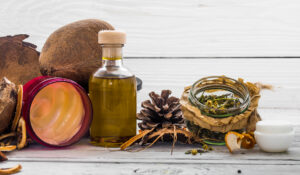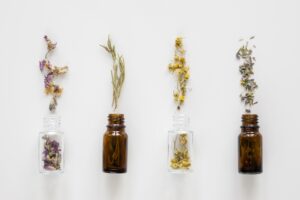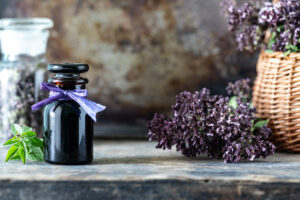In the age of clean beauty and natural hair care, essential oils have emerged as powerful, plant-based remedies for everything from dandruff and dryness to thinning hair and breakage. But are essential oils really good for your hair? Short answer: Yes—when used correctly.
In this blog, we’ll break down how essential oils can benefit your hair, which ones are best for your specific concerns, and exactly how to use them safely and effectively.
💧 Why Use Essential Oils for Hair?
Essential oils are concentrated plant extracts that carry the essence of their source—this includes scent, antioxidants, anti-inflammatory compounds, and antimicrobial properties. When used on the scalp and hair, they can:
-
Boost circulation to promote hair growth
-
Reduce dandruff and soothe scalp irritation
-
Strengthen strands and reduce breakage
-
Add shine, softness, and manageability
-
Support overall scalp health
But remember: Essential oils must always be diluted with a carrier oil (like coconut, argan, or jojoba) before applying directly to the skin or scalp.
🌿 Top Essential Oils for Hair & Scalp Health
Here are some of the most effective essential oils for different hair goals:
1. Rosemary Oil – For Hair Growth & Thinning Hair
Rosemary essential oil is one of the most studied oils for promoting hair growth. It increases circulation to the scalp, which helps deliver nutrients to hair follicles.
✅ Stimulates hair regrowth
✅ Helps slow down hair thinning
✅ Ideal for both men and women experiencing hair loss
How to use:
Mix 5 drops with 1 tbsp of jojoba oil. Massage into scalp, leave for 30 minutes, then shampoo.
2. Tea Tree Oil – For Dandruff & Itchy Scalp
Tea tree oil has antifungal and antibacterial properties that help unclog hair follicles and soothe irritated scalps.
✅ Fights dandruff and dry scalp
✅ Prevents scalp acne and buildup
✅ Adds a cooling sensation
How to use:
Add 3 drops to your shampoo or mix with coconut oil and apply to scalp 2–3 times a week.
3. Peppermint Oil – For Scalp Circulation & Refreshing Cleanse
Peppermint oil creates a tingling sensation that increases blood flow to the scalp—key for supporting healthy hair growth.
✅ Invigorates scalp and hair follicles
✅ Helps remove buildup
✅ Leaves hair feeling fresh
How to use:
Combine 2–3 drops with 1 tbsp of carrier oil. Massage onto scalp and rinse after 20 minutes.
4. Lavender Oil – For Hair Growth & Calming Irritation
Lavender oil not only smells amazing, but it’s known for improving hair growth and balancing scalp oil production.
✅ Antimicrobial and anti-inflammatory
✅ Promotes thicker, fuller hair
✅ Calms itchy or sensitive scalp
How to use:
Mix 5 drops with 1 tbsp of sweet almond oil and massage into scalp. Leave on overnight for best results.
5. Cedarwood Oil – For Oily or Flaky Scalp
Cedarwood balances oil-producing glands in the scalp and has antifungal properties.
✅ Reduces hair loss
✅ Controls excess oil
✅ Works well in hair masks and blends
How to use:
Blend with rosemary and lavender oils for a powerful hair-supporting treatment.
6. Chamomile Oil – For Shine & Soothing
Perfect for people with irritated, dry scalps or sensitive skin.
✅ Adds shine and softness
✅ Soothes scalp inflammation
✅ Gentle enough for frequent use
How to use:
Add a few drops to your conditioner or create a calming rinse with chamomile tea and chamomile oil.
🛠 How to Use Essential Oils for Hair: Methods That Work
💆♀️ 1. Scalp Massage
-
Mix essential oil with a carrier oil
-
Massage into scalp in circular motions for 5–10 minutes
-
Leave for at least 30 minutes or overnight
-
Shampoo and rinse
🧴 2. Add to Shampoo or Conditioner
-
Add 3–5 drops of essential oil to your usual shampoo or conditioner
-
Use as normal—this is great for daily maintenance
🌙 3. Overnight Hair Treatment
-
Mix oils and apply to scalp and hair
-
Cover with a shower cap or silk scarf
-
Wash out in the morning
💦 4. Hair Rinse
-
Combine a few drops with apple cider vinegar or herbal tea (like rosemary or chamomile)
-
Pour over hair after shampooing and let sit before rinsing
⚠️ Safety Tips for Using Essential Oils on Hair
-
Always dilute essential oils in a carrier oil to avoid irritation
-
Do a patch test before full application
-
Avoid contact with eyes and mucous membranes
-
Use only high-quality, 100% pure essential oils (no synthetic fragrance oils)
-
Consult a professional if pregnant, nursing, or treating a medical condition
🌍 Final Thoughts
Essential oils can transform your hair care routine when used correctly. Whether you’re aiming for longer locks, less dandruff, or a healthy, balanced scalp, nature’s most aromatic tools are here to help.
💡 Pro Tip: Not all essential oils are created equal. Make sure you’re sourcing from a trusted supplier—ideally one that works directly with farmers and distillers.





